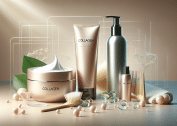Curious about the real impact of collagen on your skin’s health and radiance? Explore how collagen supplements, nutrition, and lifestyle changes can support natural beauty goals and influence visible signs of aging. Dive into the facts, challenges, and breakthroughs surrounding collagen and discover new ways to nurture your skin.
The Essentials Behind Collagen and Skin Health
Collagen is often highlighted in wellness and beauty circles for its supposed benefits, but what is collagen and why does the body rely on it for healthy skin? This naturally occurring protein makes up a significant portion of skin, hair, and connective tissues, playing a central role in firmness and elasticity. Loss of collagen with age contributes to the appearance of fine lines and wrinkles, which is a common concern for those seeking non-invasive options to maintain youthful skin. By understanding collagen’s structure and function, exploring its supportive role in wound healing, and considering ways to promote its synthesis through nutrition and lifestyle, people can adopt more informed skincare routines. Scientific research continues to investigate the relationship between collagen intake and visible improvements in skin texture, providing a foundation for many emerging wellness trends. (Source: https://www.ncbi.nlm.nih.gov/pmc/articles/PMC7082447/)
The breakdown of collagen is a gradual process, influenced by factors such as sun exposure, smoking, and dietary habits. These external and internal influences can accelerate the visible signs of skin aging, emphasizing the importance of protecting the skin and supporting the body’s collagen production naturally. Antioxidants, vitamins C and E, and certain amino acids are beneficial for collagen synthesis, and research regularly highlights the value of a balanced diet rich in produce, lean proteins, and healthy fats. There’s also a growing awareness of how stress management and sleep patterns contribute to the skin’s capacity for regeneration, reinforcing the view that holistic wellness is integral to achieving radiant skin. Learning about collagen’s multifaceted role can help refine beauty routines and focus on sustainable strategies that go beyond topical products. (Source: https://www.health.harvard.edu/staying-healthy/collagen-benefits-and-claims)
Awareness of collagen’s benefits is expanding thanks to ongoing education and media coverage, which encourage people to seek both preventative and restorative approaches to skin health. Consumers encounter collagen in lotions, serums, powders, and capsules, each promising visible results. However, dermatologists recommend investigating product labels and scientific studies before adopting a routine. Not all collagen supplements or creams are created equal, and the body’s absorption rate is a key consideration. Combining research-backed skincare with healthy lifestyle changes can support both short- and long-term beauty goals, creating a foundation for skin that radiates health from within. (Source: https://www.aad.org/public/everyday-care/skin-care-basics/care/collagen)
Types of Collagen and Why They Matter for Beauty
There are at least 16 different types of collagen throughout the body, but types I, II, and III are the most abundant in skin, bones, and cartilage. Type I collagen provides strength and resilience to the skin’s dermal layer, defending against sagging and promoting firmness. Type III supports the structure of muscles and organs, often pairing with Type I to increase suppleness. Each collagen type offers unique structural advantages, so it’s important to recognize which types are most relevant to skin elasticity for beauty routines. By focusing on nutritional sources and beauty products that target these primary collagen forms, many pursue a more tailored approach to enhancing their skin’s natural defenses and youthful qualities. (Source: https://www.ncbi.nlm.nih.gov/pmc/articles/PMC6835901/)
The rise of marine collagen—derived from fish—has added a new dimension to the wellness industry. Studies have shown that marine collagen is especially rich in type I collagen and is often considered more bioavailable, meaning it may be more easily absorbed by the body. Bovine and chicken collagens are also frequently found in supplements and topical formulations, with each source offering a unique blend of collagen types. This diversity provides consumers with flexible options to address personal skincare needs, especially as research continues to investigate differences in effectiveness and potential allergenicity among sources. Whether exploring hydrolyzed collagen powders or peptide-rich serums, learning about ingredient origins remains a best practice for anyone navigating the beauty and wellness space. (Source: https://ods.od.nih.gov/factsheets/Collagen-Consumer/)
Understanding product labels and ingredient lists is increasingly important as the supplement market expands. Not every formula delivers the same concentration or purity of collagen, and some combine multiple types to broaden their potential benefits. It’s also vital to assess whether a product includes synergistic ingredients such as vitamin C, which is essential for collagen synthesis and can amplify the results of supplementation. Transparency in manufacturing, third-party testing, and guidance from healthcare professionals help ensure that chosen collagen products align with an individual’s beauty and safety goals. This knowledge empowers informed decision-making, whether the intention is to address visible aging or maintain overall skin wellness.
Exploring Collagen Supplements: Claims, Realities, and Absorption
The wellness industry has seen soaring demand for collagen supplements, driven by consumer hopes for smoother, firmer skin. Powders, capsules, drinks, and gummies crowd the shelves, but how effective are they? Scientific studies offer promising, yet sometimes mixed, results. Some evidence supports that hydrolyzed collagen—where collagen is broken down into smaller peptides—may improve skin hydration and reduce the appearance of wrinkles when consumed regularly. However, much of the perceived improvement may also depend on overall health, genetics, and other dietary choices. It’s important to consult scientific studies and trusted medical advice before starting a new supplement routine to maximize potential benefits and minimize possible risks. (Source: https://www.mayoclinic.org/drugs-supplements-collagen/art-20368484)
Beyond efficacy, absorption is a key factor influencing supplement results. Pure collagen is a large molecule, so the body’s ability to use it as intended depends on its form. Hydrolyzed collagen is often recommended because it’s easier for the digestive tract to process, converting collagen proteins into peptides that enter the bloodstream. Some supplements also include digestive enzymes, which may promote more efficient breakdown and absorption. Personal experience with supplements varies widely, and potential outcomes are influenced by consistency, dosage, and product integrity. Paying attention to these details can help set realistic expectations for collagen use in a skincare regimen.
Transparency is crucial for choosing reputable products. Brands that subject their products to third-party testing for purity and accuracy are often preferred. While marketing materials frequently promise visible, tangible results, it’s vital to cross-check them with independent clinical studies and healthcare recommendations. The journey to healthier skin is unique for everyone, and collagen supplements, when combined with balanced nutrition and holistic self-care, may become a valuable piece of the beauty puzzle. Always approach new products with a discerning mindset, prioritizing safety and evidence-based practices. (Source: https://www.niams.nih.gov/health-topics/supplements)
Diet and Lifestyle Choices That Boost Collagen Naturally
Collagen synthesis is deeply influenced by everyday choices. Diet plays a powerful role—vitamin C, zinc, copper, and amino acids all contribute to the body’s ability to repair skin and create new collagen. Foods such as citrus fruits, leafy greens, nuts, eggs, and bone broth introduce these nutrients, supporting a sustainable way to nurture collagen from within. Creating a colorful, nutrient-rich plate can have both immediate and long-term positive impacts on skin resilience and vibrancy. (Source: https://www.eatright.org/health/wellness/preventing-illness/6-foods-that-naturally-increase-collagen-production)
Lifestyle factors such as exposure to UV light, alcohol, smoking, and chronic stress can undermine collagen integrity. Protective skincare strategies, including the use of sunscreen, moisturizing agents, and antioxidant-rich serums, help fortify the skin’s barrier and promote optimal collagen retention. Practicing stress management—through exercise, relaxation techniques, or regular sleep—also plays a significant role in recovery and renewal. These combined approaches reinforce the body’s ability to restore itself, working alongside supplements and topical products to address signs of fatigue and environmental damage.
Staying hydrated is another overlooked practice with outsized benefits. Water supports skin elasticity and nutrient transport, both of which are essential for the ongoing creation of new collagen. Fostering habits such as regular movement, healthy sleep, and receptive self-care ultimately supports the body’s natural repair mechanisms. Building these practices into a daily routine ensures that collagen production and, by extension, overall skin health are continuously supported, putting radiant skin within reach through everyday actions.
Collagen Topicals and Professional Treatments Versus Supplements
Alongside ingestible collagen, the beauty market offers a wide variety of topical products like creams, serums, and masks claiming to boost skin firmness and smoothness. It’s important to understand that the effectiveness of topical collagen is limited by its ability to penetrate the skin barrier. Large collagen molecules tend to remain on the skin’s surface, providing temporary hydration rather than structural renewal. However, some formulas incorporate small peptides, antioxidants, and supporting ingredients like retinol, which work together to encourage the body to produce more collagen naturally. (Source: https://www.psoriasis.org/advance/collagen-skin-care-benefits/)
Professional treatments, such as microneedling, laser therapy, and microdermabrasion, can trigger the skin’s healing response and induce new collagen synthesis. These procedures are performed by licensed professionals and should be carefully considered based on individual goals and skin sensitivities. While these techniques may yield efficient results, they often come with longer recovery times, potential side effects, and higher costs than at-home regimens. Consulting a dermatologist or certified practitioner ensures that treatments are appropriate and that expectations are realistically managed.
When choosing between topicals, oral supplements, and in-office procedures, it’s essential to weigh personal preferences, lifestyle, and desired outcomes. No single option is universally effective, and many benefit from a combination of approaches. The key is layering methods proven by research, paying close attention to skin needs and professional advice. The journey toward youthful, resilient skin can be empowering when based on guidance rooted in science, patience, and personalized care.
Making Informed Choices for Lasting Skin Wellness
Pursuing healthier skin with collagen as part of the strategy encourages curiosity and mindful decision-making. By examining scientific evidence and avoiding reliance on exaggerated marketing, it’s easier to set realistic expectations and create a supportive beauty routine. Tracking results, staying attentive to skin changes, and adapting routines as needed will foster a deeper understanding of how the body responds to various products and practices. This journey is unique for each person, emphasizing that progress, not perfection, helps maintain motivation and optimism.
Personalization is essential in the world of beauty and wellness. Genetic factors, environmental exposures, and lifestyle choices all interact to impact how collagen is both produced and retained. A one-size-fits-all approach rarely works, making self-reflection, ingredient research, and professional consultations valuable assets in crafting a skincare plan. Incorporating new knowledge as research evolves ensures that beauty routines remain effective, safe, and aligned with meaningful goals.
Ultimately, taking a holistic view—from nourishing foods to evidence-based supplements, topical applications to professional procedures—empowers everyone to nurture their skin’s health naturally. Collagen is just one part of the picture, but exploring its possibilities rewards the pursuit of enhanced beauty, vitality, and confidence. The shared goal is radiant skin that accurately reflects well-being from the inside out.
References
1. NCBI. (2020). Collagen for skin health. Retrieved from https://www.ncbi.nlm.nih.gov/pmc/articles/PMC7082447/
2. Harvard Health Publishing. (n.d.). Collagen benefits and claims. Retrieved from https://www.health.harvard.edu/staying-healthy/collagen-benefits-and-claims
3. American Academy of Dermatology Association. (n.d.). Collagen: What it is and what it does. Retrieved from https://www.aad.org/public/everyday-care/skin-care-basics/care/collagen
4. National Institutes of Health ODS. (n.d.). Collagen: Fact Sheet for Consumers. Retrieved from https://ods.od.nih.gov/factsheets/Collagen-Consumer/
5. Mayo Clinic. (n.d.). Collagen: Are supplements effective? Retrieved from https://www.mayoclinic.org/drugs-supplements-collagen/art-20368484
6. Academy of Nutrition and Dietetics. (n.d.). 6 Foods That Naturally Increase Collagen Production. Retrieved from https://www.eatright.org/health/wellness/preventing-illness/6-foods-that-naturally-increase-collagen-production









